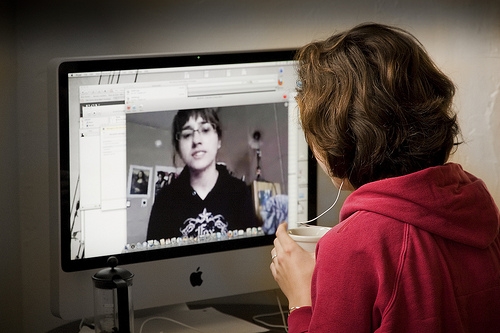
11th June 2020
 We’ve been chatting with lots of our Digital Champions about how they provide digital skills support - whether that's remotely or face-to-face.
We’ve been chatting with lots of our Digital Champions about how they provide digital skills support - whether that's remotely or face-to-face.
Here is a quick-fire round-up of some of the top tricks and tips...
- Take. It. Slowly.
- Talk their language. If it’s a ‘pointer’ rather than a Cursor or a ‘button’ rather than a Computer Key, let it be so.
- Break the task down into distinct steps, however simple. It will help you and your learner feel like you’re making progress. And progress is a wonderful thing.
- Taking notes aids memory and understanding. Give your learner time to write stuff down.
- Go easy on yourself, this is hard.
- It’s about small steps, not giant leaps. Teaching online shopping? Start with browsing a supermarket website and writing a shopping list a neighbour could use. Leave the online transaction for another time.
- Email is great but save it for afterwards for sending links, questions, guides etc, don't do it as you go along - so you can keep the learning flow, man.
- Location matters so make sure you’re both somewhere where you’ll not be disturbed.
- Don’t try to do too much in one go. The average adult attention span is 15-20 minutes.
- Not every detail is important when describing an online thingy. So leave some out. You just need to get the main point across.
- If you're doing it remotely, try and use the same browser/device as the learner so you can see what they see.
- Focus and listen. If you're online, less visual clues mean it’s easy to miss when someone’s got confused or panicked by your instructions.
- Zoom, Facetime or Skype? Zoom seems to be the popular choice but experiment and see what works best for your learner.
- Don’t underestimate the telephone. 81% of remote Digital Champions are giving their help this way.
- Wherever you are, allow time to sit back and let your learner practice on their own. It will help them remember what you’ve said.
- Need kit? These guys might be able to help: FutureDotNow and Wavelength.
- Need connectivity? Lots of internet companies have removed data caps, and some, like BT Basic, offer low cost phone and broadband packages.
- Create your own demo. Some devices and programmes like Macs and Windows 10 have built-in screen recording.
- The top three things people want help with right now are using video tools, online boredom busters and using email.
- Use a Voice Recorder for 'How to Do' instructions and email it as an MP4 file.
- Take screen shots. You could send these separately ie via Whatsapp.
- If the internet’s dodgy make sure you and your learner are sitting as close to the router as possible.
- If the internet’s still dodgy, use the ethernet cable and/or reset, otherwise known as the classic turn on and off again approach. Our guide might help too.
- Make it fun. Help them play online scrabble, take virtual tours, plan a holiday, learn the ukulele.
- Pause a little and listen to their fears. What aspects of digital technology can help ease their personal concerns?
- You don’t have to have all of the answers. No one does. It's fine to say you don't know and go and find out more. Or you can refer to a digital helpline, like AbilityNet that’s manned by expert tutors? 0800 048 7642.
- Be encouraging, even if someone is doing it wrong, over and over, and over again. Encouragement gives hope.
- Print a couple of our how-to guides for your learners. We’ve got hundreds, literally hundreds, of them.
- Talk about scams. There’s some great advice here. And you can report suspicious activity to the National Cyber Security Centre via report@phishing.gov.uk.
- Further your knowledge and skills with our free technology guides.
- Or try our free course on helping learners stay safe online.
- Remember, we are all learning.